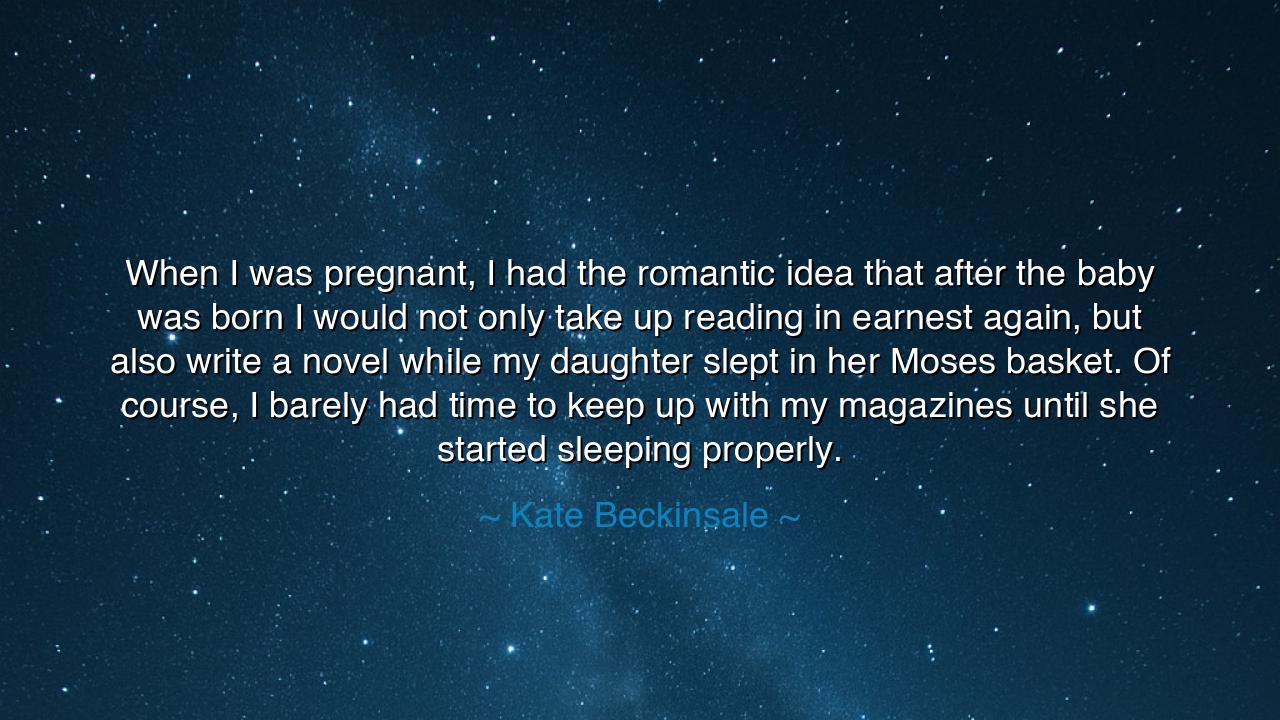
When I was pregnant, I had the romantic idea that after the baby
When I was pregnant, I had the romantic idea that after the baby was born I would not only take up reading in earnest again, but also write a novel while my daughter slept in her Moses basket. Of course, I barely had time to keep up with my magazines until she started sleeping properly.






Hear the words of Kate Beckinsale, spoken with honesty and humility: “When I was pregnant, I had the romantic idea that after the baby was born I would not only take up reading in earnest again, but also write a novel while my daughter slept in her Moses basket. Of course, I barely had time to keep up with my magazines until she started sleeping properly.” What she confesses here is the eternal struggle between the dreams we weave in anticipation and the reality that greets us when life unfolds. It is the difference between the vision of peace we imagine and the chaos of love and responsibility that reality demands.
The romantic idea is a familiar companion to all who dream of new beginnings. When life promises transformation—be it marriage, childbirth, or a new season of work—we imagine that our days will become ordered, filled with quiet productivity, and that all our ambitions will unfold easily alongside our new joys. Beckinsale, carrying her child, envisioned herself not only as a mother but also as a reader and a novelist, using the silence of her child’s rest to craft beauty from her own hands. Yet the truth proved otherwise. The reality of motherhood, with its endless demands, stripped away the fantasy and left her grateful to snatch even a moment for a magazine.
This is no failure, but a revelation. For all of history, mothers have known that life with children reshapes the self entirely. Consider Mary Wollstonecraft, the great philosopher and author, who, even while writing works that shook the foundations of society, struggled under the burdens of child-rearing and domestic upheaval. Her words were carved out in fragments of time, in the stolen hours between the cries of her child and the struggles of daily life. Beckinsale’s confession echoes this ancient truth: that motherhood, while glorious, is all-consuming, and often the mother must set aside her visions of personal achievement until new rhythms emerge.
And yet, within this humility lies strength. For the romantic idea is not wasted, even if it is not fulfilled as imagined. Dreams, though interrupted, plant seeds. The novel may not have been written in those early months, but the longing to create, to return to reading, to shape words—remained. Sometimes life demands patience, and what cannot be done in one season will flourish in another. Beckinsale herself, in her career and in her art, would later prove that the fire of creation, though delayed, is not extinguished.
The meaning of her words stretches beyond motherhood. They remind us all that when we begin great journeys, whether in family, in work, or in love, we often envision them through the lens of romance, imagining a life of order and beauty. Reality, however, is rougher, noisier, and filled with interruptions. Yet it is in that reality—not the imagined perfection—that the true growth occurs. It is there we learn resilience, sacrifice, and the art of surrendering without losing hope.
The lesson, therefore, is this: cherish your romantic ideas, for they inspire you, but hold them lightly. Do not despair when life refuses to bend to your fantasies. Instead, adapt, endure, and wait. Take joy in the small victories—reading a page when you thought you’d read a book, writing a note when you thought you’d write a novel. These fragments of creation are not failure, but steps toward a future where the fullness of your dream may yet be realized.
Therefore, children of tomorrow, do not scorn yourselves when your ambitions are slowed by love, duty, or responsibility. Know that the rhythm of life is not always aligned with the rhythm of desire. Patience is itself a form of strength, and love, though demanding, enriches all the works that will one day come forth from your hands.
Thus Beckinsale’s words, though spoken of motherhood, become a universal counsel: the romantic idea will always meet the reality of life, and though reality may humble us, it also shapes us. And in that shaping lies the truest path to wisdom, resilience, and eventual creation.






AAdministratorAdministrator
Welcome, honored guests. Please leave a comment, we will respond soon